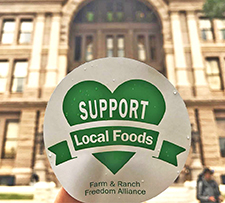One week of Session left: Where things stand now
Published May 24, 2021
Thank you for all of your activism this Session. With one week left, we are rapidly approaching the end of this intense time. Remember, though, whatever the outcome of Session, this is only one step in the journey of making change in our food system.
The Calendars committee will meet sometime Sunday, May 23, to set the final calendar for House votes. We continue to push for SB 617, the Farmers’ Market bill, to be included. If you haven’t already emailed or called, please do so now! Here’s a link to our action alert with all the details. [UPDATE for May 24: The bill was sent to the full House for a vote, which could come sometime on Tuesday, May 25!]
The Good News:
 We’ll start with two pieces of good news. First, our Healthy Soils bill, SB 1118, has passed the last hurdle in the process! Once a bill passes the House and Senate, the Governor has 10 days to sign, veto, or allow it to become law without his signature. Yesterday was the deadline for SB 1118, and the Governor chose the last option.
We’ll start with two pieces of good news. First, our Healthy Soils bill, SB 1118, has passed the last hurdle in the process! Once a bill passes the House and Senate, the Governor has 10 days to sign, veto, or allow it to become law without his signature. Yesterday was the deadline for SB 1118, and the Governor chose the last option.
This bill creates the “On-the-Ground Conservation” program at the Texas State Soil & Water Conservation Board, directing the agency to provide education, technical assistance, and grant support for landowners who want to implement healthy soils management, increase their resilience to extreme weather events, sequester carbon, and more. While there is no state funding provided, the Board has identified multiple federal programs that could provide the necessary resources.
This is a big win for regenerative agriculture in Texas! Many thanks go to Senator Johnson (D-Dallas) and Representative Wilson (R-Marble Falls) for championing this bill.
The other type of good news that comes out of session is the killing of BAD bills, and it looks like we will be able to stop the “Ag-gag” bill. As filed, the bill would have imposed criminal penalties on whistleblowers and undercover activists who reveal unethical or illegal activity on agricultural operations if they obtain the information through “unauthorized access” to the facility or materials.
HB 1480/SB 472 was brought to the legislators by the Poultry Federation, who chose to talk only about the portions of the bill dealing with physical damage or trespass on an ag operation – carefully not mentioning the Ag-gag provision they had slipped in. FARFA testified against the bill in the House Committee, which you can watch here. (The bill is the first one discussed, and FARFA’s ED testifies at the 18:30-minute mark.)
After that hearing, we spent a lot of time talking with legislators and staff about the problems created by the Ag-gag language. The House amended the bill on the floor to make it somewhat less bad, but still with the potential to threaten whistleblowers. But last week, the Senate sponsor, Senator Kolkhorst (R-Brenham), took out the Ag-gag provision entirely!
The bill now addresses only things like trespass, vandalism, theft, and physical damage to agricultural operations. HB 1480, as amended, is on the Senate’s local and uncontested calendar. The next step will be for the House to decide whether to concur in the amendment or try to work out the differences in conference committee – so we do have one more hurdle to overcome before we can declare full victory.
And Now the Bad News:
The Home Food Security Bill, HB 1686, is dead. Although the bill passed with overwhelming bipartisan support in the House (143-1), and a majority of the Senate Local Government Committee had indicated that they would vote yes, Chairman Bettencourt refused to allow a vote on it. Bettencourt has bragged on Facebook about passing a bill this session to protect people’s right to have religious symbols in their front yards, and he voted for a bill to prevent property taxes from being imposed on chicken coops and rabbit hutches – but he killed the bill to protect people’s right to actually HAVE those chickens and rabbits, or to have a GARDEN in their front yard.
If you are in Senator Bettencourt’s district, it is important that he know that his constituents are paying attention. Even now, do not be rude. Always treat legislators and their staff with basic courtesy and respect. But if you live in his district, you are entitled to an explanation for why he would block this bill. (Here is a map of the district.)
Stay tuned for a complete wrap-up email, with a full discussion of all the good and bad news. We will also focus on how to hold your legislators accountable, for both their good votes and their bad ones.
 Changing the system is a long process, with many ups and downs. Your calls and emails, the in-person meetings, the negotiation sessions – all of these are pieces of the work that make a difference to the laws and regulations that govern our food system.
Changing the system is a long process, with many ups and downs. Your calls and emails, the in-person meetings, the negotiation sessions – all of these are pieces of the work that make a difference to the laws and regulations that govern our food system.
Sometimes we hit a home run the first time out, as we did with the healthy soils bill this session, or our previous sessions’ bills to require DSHS and local health departments to answer questions and be bound by those answers. More often, it takes multiple sessions and years of hard work to be successful.
It took 10 years to go from all sales of homemade foods being illegal to the expansive, vibrant cottage food law that we have now. It took 12 years to go from an agency attempt to even further restrict raw milk access (with DSHS’s 2009 proposed regulations) to new rules that not only make raw milk more available, but also address such things as inspection frequency and sampling. There were times when it seemed like we would never succeed, where we took 2 steps back for every step forward. But we don’t give up.
Thank you for your support as we continue to fight for common-sense policies for small-scale farmers and producers, so that we can build a resilient, sustainable food system.